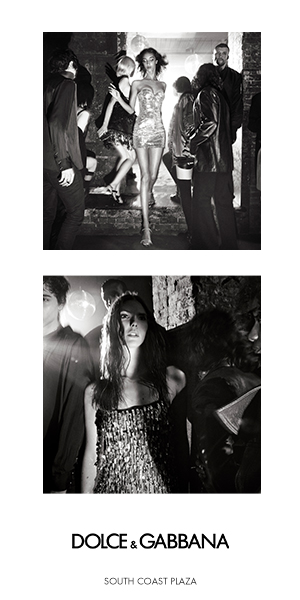As time went on, though, Lipman grew worried that the brand he’d worked so hard to build was in real trouble. His employees were receiving calls from agents, angry that their clients weren’t getting paid. “It was a huge mistake,” he says of giving up control. “Catastrophic. And when I realized that I wanted it back, it was too late. Nobody was listening to me.” He couldn’t have afforded to buy it back anyway.

The agency created edgy campaigns for Equinox from 2003-5
In mid-September 2013, Lipman was at his son’s baseball game when he received an emergency phone call from the board. They were going to file for bankruptcy, imminently. Lipman says he lobbied to hold off: It was the middle of campaign season, and filing for bankruptcy would leave his clients with half-finished ads for their spring collections. There was enough cash flow to operate until December, Lipman argued, but the board, he says, decided to go through with the bankruptcy anyway. (Calls to Spellman’s attorney and several board members went unreturned. The attorney representing former Revolate president Michael Mendenhall said in an e-mail that his client declined to comment.)
Within a week, the office was closed and 60 employees were left scrambling to find new jobs. According to court documents, the agency’s debts totaled $9 million at the time of the filing. Harry Winston was one of several companies that filed suit around that time, alleging that the Lipman agency and Revolate “intentionally and knowingly duped Harry Winston International into making advance payments for media buys” and, in turn, used that money to fund unrelated Revolate interests. The suit was ultimately put on hold when the agency filed for bankruptcy.
Lipman’s friend and former employee Hunter Lee Soik called to check in on him after hearing the news. “I just said, ‘Hey man is everything okay?’ He was pretty quiet about it. He didn’t say too much,” recalls Lee Soik. “That was the moment I knew things were really starting to unravel.”
In the weeks that followed, Lipman holed up in his apartment while reporters lurked outside his front door. He contemplated taking his own life. “I understand now why people commit suicide,” he says.
But Lipman was never the sort of man to stay defeated—he loved the work too much to give it up. He accepted the first consulting job that was offered to him, and it wasn’t long, he says, until former clients started calling again. He began working out of a friend’s office space, consulting for brands like 7 For All Mankind, Caesars Las Vegas and HBC, the parent company of Saks Fifth Avenue, Lord & Taylor and Hudson’s Bay. HBC executive chairman Richard Baker, who had worked with Lipman on a number of rebranding projects before, says he had “absolutely no” hesitation about his decision to hire Lipman again. Says Baker, “I don’t know the details of what happened to his firm, but I do know that talent is rare… and he has talent.”
Another client, luxury real estate developer Extell, was equally unconcerned about the agency’s headline-making collapse. “We still felt that he was a creative genius… and we were very confident in what he could help us create,” says Tamar Rothenberg, Extell’s vice president of marketing. “If the ideas are unique and groundbreaking, then I think they always will be. David will always have his talent.”
Two years have passed since the agency went under, and according to Lipman’s attorney, Jeffrey Rich, the bankruptcy trustee is currently in the process of collecting the estate’s assets. That pool will be distributed to a laundry list of creditors, of which there are nearly 400, according to the Chapter 7 filing, and Rich says that number will likely continue to grow. Lipman admits he’s not sure how things will pan out: who will get paid, how the assets will be distributed and what lawsuits might be filed. What is clear, though, is that there will never be enough money for everyone to get back what they lost.
Still, he has never been more focused on moving forward. “I blame myself,” he says. “It was absolutely heartbreaking. But I’m ready to start a new chapter of my life.”
He recently launched a consultancy company called Creative Brand Craftsmanship and has a team of six employees working out of his East Village home. It’s not the Lipman agency 2.0: Rather than acting as a full-service firm, Lipman serves as a creative consultant to clients like Extell, as well as to European fashion brands Cerruti, Gieves & Hawkes and Kent & Curwen. The biggest difference is that the only cash that funnels through CBC is money to be paid to Lipman and his employees. “I don’t want 20 clients or 60 clients,” he says. “I want a dozen clients that I can work with intimately.” He’s also attempting—at least in a small way—to repay the hairdressers, makeup artists, stylists and photographers who got stiffed by hiring them for jobs whenever he can.
And despite his past, clients—current and former—see no reason he can’t pull it off; that even his determination to return speaks to the sort of risk-taking drive that makes good ad men great. “To see someone who had such a strong career be humbled enough to stand up, dust off and go back out there,” says Lee Soik, “that speaks volumes about who David is.”









































